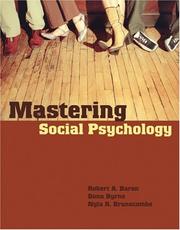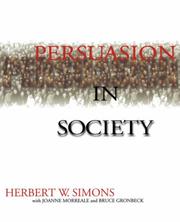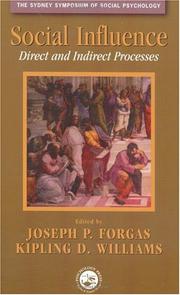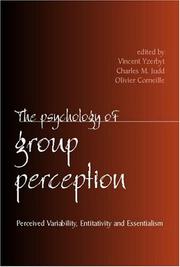| Listing 1 - 10 of 16 | << page >> |
Sort by
|

ISBN: 0205532691 9780205532698 0205495893 Year: 2007 Publisher: Boston Pearson
Abstract | Keywords | Export | Availability | Bookmark
 Loading...
Loading...Choose an application
- Reference Manager
- EndNote
- RefWorks (Direct export to RefWorks)
Social psychology --- Agressivité --- Influence sociale --- Perception sociale --- Psychologie sociale --- Comportement prosocial --- Dynamique de groupe --- Perception d'autrui --- Relation interpersonnelle

ISBN: 0521454824 0521030455 0511527527 Year: 1998 Volume: [13] Publisher: Cambridge : Cambridge University Press,
Abstract | Keywords | Export | Availability | Bookmark
 Loading...
Loading...Choose an application
- Reference Manager
- EndNote
- RefWorks (Direct export to RefWorks)
This book addresses a phenomenon that has been much studied in anthropology, sociology and administrative science - the social structural foundations of coordinated activity and consensus in complexly differentiated communities and organizations. Such foundations are important because social differentiation makes coordination and agreement especially hard to achieve and maintain. Friedkin focuses on the process of social influence, and on how this process, when it is played out in a network of interpersonal influence, may result in interpersonal agreements among actors who are located in different parts of a complexly differentiated organization. This work builds on structural role analysis which provides a description of the pattern of social differentiation in a population. Interpretation of the revealed social structures has long been a problem. The steps for structural analysis that are proposed in this book are addressed to the above problem. To explain the coordination of social positions, the author pursues the development of a structural social psychology that attends to both social structure and process.
Social influence. --- Social structure. --- Influence sociale --- Structure sociale --- Social Sciences --- Sociology --- Organization, Social --- Social organization --- Anthropology --- Social institutions --- Influence (Psychology) --- Social psychology --- Prestige --- Social pressure
Book

ISSN: 1242952X ISBN: 2200343302 9782200343309 Year: 2005 Publisher: Paris : Armand Colin,
Abstract | Keywords | Export | Availability | Bookmark
 Loading...
Loading...Choose an application
- Reference Manager
- EndNote
- RefWorks (Direct export to RefWorks)
Interpersonal relations --- Social values --- Interviews --- Relations humaines --- Valeurs sociales --- Entretiens --- Case studies --- Cas, Etudes de --- #SBIB:316.21H00 --- Theoretische sociologie: inleidingen op de huidige toestand --- Sociology --- Methodology --- Enquêtes sociologiques --- Individu et société --- Influence sociale --- Enquêtes sociologiques. --- Individu et société. --- Influence sociale. --- Case studies. --- Sociology - Methodology --- Sociology - Case studies
Book
ISBN: 9789056296155 9789048511921 9048511925 9056296159 1282985078 9786612985072 Year: 2009 Publisher: Amsterdam Vossiuspers
Abstract | Keywords | Export | Availability | Bookmark
 Loading...
Loading...Choose an application
- Reference Manager
- EndNote
- RefWorks (Direct export to RefWorks)
Waarom roept hoofdpersoon Henri Osewoudt in De donkere kamer van Damokles vlak voor zijn dood uit dat zijn opdrachtgever Dorbeck 'alles' is? Gaat het hier om navolging?De Franse filosoof René Girard ( geb.1923) ontdekte de grote rol van navolging en van begeerte in klassieke romans. Later wees hij erop dat navolging tijdens een crisis leidt tot het ontstaan van dubbelgangers, rivaliteit, geweld en slachtoffers die zondebokken kunnen worden. Uitgaande van De donkere kamer van Damokles, kwam Sonja Pos tot het verrassend nieuwe inzicht dat verschillende romans en verhalen van Hermans hierop berus
Psychological study of literature --- Hermans, Willem Frederik --- Imitation in literature --- Quotation --- Literary style --- Mimesis in literature --- Originality in literature --- Plagiarism --- Girard, René, --- Hermans, Willem Frederik, --- Hermans, W. F. --- Bijkaart, Age, --- Criticism and interpretation. --- Imitation in literature. --- Prudhomme, Anastase --- Schrijver Dezes --- Hermans, Willem Frederik. --- Hermans, Willem Frederik (1921-1995) --- Influence sociale --- Relations humaines --- Critique et interprétation --- Thèmes, motifs --- Dans la littérature --- Girard, Rene,

ISBN: 0761919082 0761919074 Year: 2001 Publisher: Thousand Oaks, Calif. Sage
Abstract | Keywords | Export | Availability | Bookmark
 Loading...
Loading...Choose an application
- Reference Manager
- EndNote
- RefWorks (Direct export to RefWorks)
Social psychology --- #SBIB:309H505 --- Code en boodschap: psychologische, psycho-analytische benadering --- Persuasion (Psychology) --- Persuasion (Rhetoric) --- Social aspects. --- Persuasion (Rhetoric). --- Rhetoric --- Forensics (Public speaking) --- Oratory --- Communication --- Conformity --- Influence (Psychology) --- Propaganda --- Psychology, Applied --- Social aspects --- Communication non verbale --- Éthique --- Influence sociale --- Publicité --- Communication verbale --- Politique

ISBN: 0321011473 Year: 2001 Publisher: Boston Allyn and Bacon
Abstract | Keywords | Export | Availability | Bookmark
 Loading...
Loading...Choose an application
- Reference Manager
- EndNote
- RefWorks (Direct export to RefWorks)
Consumer behavior --- 659 --- 659.02 --- Influence (Psychology) --- Persuasion (Psychology) --- Compliance --- Compliant behavior --- Conformity --- Cooperativeness --- Psychology --- Communication --- Propaganda --- Psychology, Applied --- Example --- Publicity. Information work. Public relations --- Publicity. Information work. Public relations--?.02 --- Compliance. --- Influence (Psychology). --- Persuasion (Psychology). --- 659.02 Publicity. Information work. Public relations--?.02 --- 659 Publicity. Information work. Public relations --- Influence sociale --- Psychologie sociale --- Influence --- Manipulation
Periodical
ISSN: 01446665 Publisher: Letchworth
Abstract | Keywords | Export | Availability | Bookmark
 Loading...
Loading...Choose an application
- Reference Manager
- EndNote
- RefWorks (Direct export to RefWorks)
The journal publishes original papers in all areas social psychology. Topics covered include social cognition, attitudes, group processes, social influence, intergroup relations, self and identity, nonverbal communication, and social psychological aspects of affect and emotion, and of language and discourse.
Social psychology --- Psychology, Social --- Psychologie sociale --- Periodicals. --- periodicals. --- Périodiques --- Psychology, Social. --- Social psychology. --- Periodicals --- Psychology --- Social Sciences --- Behavioral Science (Psychology) and Counselling --- General and Others --- Rehabilitation --- Sociology. --- Health Sciences --- Psychiatry & Psychology --- Sociology --- Social Sciences. --- Périodiques --- EBSCOASP-E EJPSYCH EJSOCIA EPUB-ALPHA-B EPUB-PER-FT MDPSYCHO MDSOCMED WILEY-E --- MDPSYCHO MDSOCMED --- Cognition sociale --- Dynamique de groupe --- Influence sociale --- Interaction sociale

ISBN: 1841690384 1841690392 9781841690391 Year: 2001 Volume: 3 Publisher: Hove : Psychology Press,
Abstract | Keywords | Export | Availability | Bookmark
 Loading...
Loading...Choose an application
- Reference Manager
- EndNote
- RefWorks (Direct export to RefWorks)
Social influence --- Interpersonal relations --- Influence (Psychology) --- Influence sociale --- Relations humaines --- Influence (Psychologie) --- Interpersonal relations. --- Social influence. --- Influence (Psychology). --- Social psychology --- Prestige --- Social pressure --- Human relations --- Interpersonal relationships --- Personal relations --- Relations, Interpersonal --- Relationships, Interpersonal --- Social behavior --- Object relations (Psychoanalysis) --- Psychology --- Conformity --- Example --- Persuasion (Psychology) --- Comportement social --- Communication verbale --- Dynamique de groupe --- Processus cognitif --- Relation interpersonnelle --- Strategie cognitive

ISBN: 1841690619 9781841690612 Year: 2004 Publisher: New York (N.Y.): Psychology press
Abstract | Keywords | Export | Availability | Bookmark
 Loading...
Loading...Choose an application
- Reference Manager
- EndNote
- RefWorks (Direct export to RefWorks)
Social groups. --- Groupes, Dynamique des --- Social groups --- #PBIB:2004.1 --- Association --- Group dynamics --- Groups, Social --- Associations, institutions, etc. --- Social participation --- Sociale psychologie --- handboeken en inleidingen --- handboeken en inleidingen. --- Adaptation sociale --- Identité collective --- Influence sociale --- Interaction sociale --- Stéréotype (psychologie) --- Dynamique de groupe --- Opinion collective --- Représentation sociale --- Handboeken en inleidingen.
Book
ISBN: 2757402099 2757414038 9782757402092 Year: 2016 Publisher: Villeneuve d'Ascq : Presses universitaires du Septentrion,
Abstract | Keywords | Export | Availability | Bookmark
 Loading...
Loading...Choose an application
- Reference Manager
- EndNote
- RefWorks (Direct export to RefWorks)
Un acteur qui exprime des jugements contradictoires est considéré comme incohérent. L'ouvrage propose un modèle sociologique de l'opinion plurielle qui montre au contraire la cohérence relationnelle de ces jugements divergents. Il combine de manière nouvelle les paradigmes classiques de la multi-appartenance et de l'interactionnisme symbolique. L'idée de signature relationnelle d'une opinion suggère que, en situation d'incertitude, les jugements n'appartiennent plus à l'acteur mais aux relations de discussion où ils émergent. Illustré par les résultats de plusieurs recherches sur des réseaux sociaux, ce modèle propose une nouvelle vision des opinions qui se forment dans des structures d'interaction avant d'être dans le cerveau des acteurs. C'est une contribution originale à une sociologie cognitive qui se situe en rupture aussi bien avec l'individualisme méthodologique qu'avec le holisme. À l'opposé de l'étalage ouvert des relations qu'imposent les « réseaux sociaux » virtuels sur Internet on découvrira le bénéfice que les acteurs tirent de la séparation entre les membres de leur réseau et comment les appartenances à des milieux hétérogènes demeurent viables. À la fois précis dans la présentation de quelques courants classiques, ambitieux mais sans jargon inutile dans ses propositions théoriques, riche d'exemples concrets de recherche, cet ouvrage intéressera tous ceux qui savent que l'opinion reste un fait social majeur en deçà de ses mises en scène médiatiques.
Social networks. --- Social influence. --- Attitude (Psychology) --- Pluralism. --- Monadology --- Monism --- Philosophy --- Reality --- Attitudes (Psychology) --- Psychology --- Public opinion --- Stereotypes (Social psychology) --- Influence (Psychology) --- Social psychology --- Prestige --- Social pressure --- Networking, Social --- Networks, Social --- Social networking --- Social support systems --- Support systems, Social --- Interpersonal relations --- Cliques (Sociology) --- Microblogs --- Social networks --- Social influence --- Pluralism --- influence sociale --- interaction sociale --- psychologie --- attitude --- opinion
| Listing 1 - 10 of 16 | << page >> |
Sort by
|

 Search
Search Feedback
Feedback About UniCat
About UniCat  Help
Help News
News